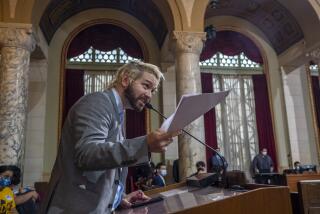Questions Over Two Memos Still Dog Yaroslavsky
- Share via
Despite attempts to distance himself from a brewing political crisis, Los Angeles City Councilman Zev Yaroslavsky is still being dogged by questions over two controversial memos that were used to help formulate his campaign strategy for next year’s mayoral race.
Deputy Mayor Michael Gage said Wednesday that he and Mayor Tom Bradley were “very skeptical” of Yaroslavsky’s contention that he had not seen early drafts of the memos that, in Yaroslavsky’s words, contained “offensive, contemptuous and insulting” language.
The documents, which were written by political consultants Michael Berman and Carl D’Agostino and kept in Yaroslavsky’s City Hall office, mocked Bradley’s intelligence and implored the councilman to focus his fund-raising efforts exclusively on “wealthy” Jews who live on the city’s Westside. The papers were leaked to The Times and reported in Tuesday’s editions.
On Wednesday, the identity of the source who provided the memos to The Times remained a puzzle. The mystery deepened when the Berman and D’Agostino firm BAD disclosed that it had been warned last month to beware of leaks to the press.
Raises Questions
Gage seized the opportunity to reap benefits from the affair. During an interview Wednesday, Gage raised several questions concerning Yaroslavsky’s responses to reporters’ questions the day before.
“Why would an internal memo be in several drafts?” Gage asked during an interview. “We find that a little hard to believe. How can the memos be largely unsolicited (as maintained by Yaroslavsky) when both Zev and his campaign deputy admit that the memos were used for campaign strategy and discussion sessions over a period of many months?
“Is it unusual that unsolicited memos provide the basis for extensive three-hour campaign strategy sessions? Isn’t the more reasonable conclusion that these memos were being used to help lay the actual groundwork for a campaign?”
Yaroslavsky declined to respond to these questions on Wednesday.
“We have nothing more to say other than what we said (Tuesday) and that is it,” said Michelle Krotinger, Yaroslavsky’s press deputy. “We really feel we answered the questions. . . . Everything has been explained.”
At a press conference Tuesday, Yaroslavsky said there were several versions of drafts written by Berman and D’Agostino and that he had never seen the pair of memos given to The Times. Instead, Yaroslavsky said he saw sanitized versions that did not contain much of the offensive language. He said that “references to religion and race” were not in the memos that he read. Yaroslavsky has refused to produce the amended memos.
In an interview with The Times Monday night, Yaroslavsky said he met with the consultants in their Beverly Hills offices to discuss the memos. He portrayed the conversation as a serious political discussion in which he read parts of the memos and parts were read to him by the two consultants. Yaroslavsky now maintains that these were sanitized versions.
However, when he initially responded to questions from The Times on Monday evening, Yaroslavsky said he was familiar with portions of the original memos that were read to him, including advice urging him to solicit campaign contributions among wealthy Jewish supporters.
Times reporter Bill Boyarsky read Yaroslavsky excerpts from the memos that included advice that “The Yaroslavsky campaign becomes the United Jewish appeal” and urged the councilman to “Make a list of every profession and/or industry where wealthy Jews abound. They should include: women’s sportswear, men’s sportswear, textile wholesalers, liquor store owners, diamond cutters, jewelers, savings and loans, retailers, criminal lawyers, trial lawyers, doctors, advertising executives, entertainment industry, etc., etc.”
Yaroslavsky responded at the time: “Obviously, what they said was not designed to be read in a metropolitan newspaper nor was what they wrote something that met with great favor and agreement by myself when I read it and when I discussed it.”
The two memos, dated March 29 and May 4, were delivered to The Times Monday. The papers were accompanied by a typed message that said: “You should be interested in this. Government is bad enough without BAD.”
Eleven days earlier, Berman and D’Agostino received an anonymous letter warning them to be “careful with press,” according to a copy provided to The Times. The letter continued, “At least two people are feeding rumors to press. If press does not move on the stories they are spreading, they plan to take same information then to opposing side in a particular race.”
D’Agostino said he is convinced from the syntax and cryptic wording that the July 28 letter and the message accompanying the memos delivered to The Times that they were written by the same person.
During his press conference on Tuesday, Yaroslavsky said the memos were stolen from his office.
“I don’t know how it got out of here,” Yaroslavsky said. “I wouldn’t even begin to speculate.”
Spokesmen for both Yaroslavsky and BAD, who are hoping the controversy will dissipate shortly, said they had no plans to file a police complaint.
More to Read
Sign up for Essential California
The most important California stories and recommendations in your inbox every morning.
You may occasionally receive promotional content from the Los Angeles Times.













